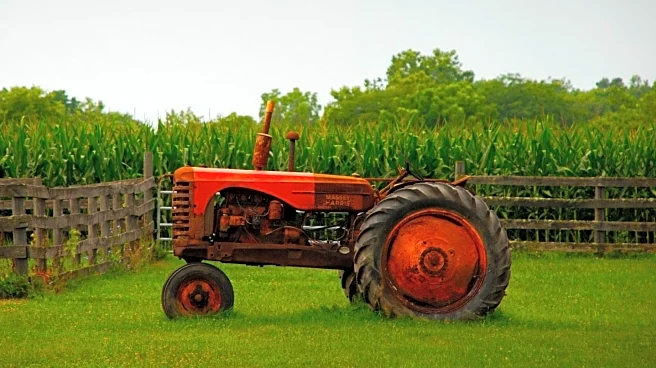What's Happening?
A gathering of antique tractor enthusiasts took place at the Brown County Historical Society in Hiawatha, Kansas, showcasing vintage agricultural machinery. The event, supported by the Northeast Kansas Antique
Machinery Association, attracted a significant number of attendees interested in preserving the history of farming equipment. Participants, including Allen Torkelson, a retired farmer from Robinson, Kansas, displayed their collections of restored tractors and corn pickers, sharing memories and experiences from past generations. The event highlighted the passion for maintaining and restoring antique tractors, with individuals like Sandy Sanders from Sabetha, Kansas, showcasing his recently restored 1953 DC Case tractor. The gathering served as a platform for enthusiasts to connect, share knowledge, and inspire younger generations to appreciate the historical significance of these machines.
Why It's Important?
The preservation of antique tractors and farming equipment is crucial for maintaining the historical narrative of agricultural practices in the United States. Events like the one in Hiawatha, Kansas, play a vital role in fostering community engagement and intergenerational learning. By showcasing restored machinery, enthusiasts help bridge the gap between past and present agricultural technologies, offering insights into the evolution of farming methods. This cultural preservation not only honors the legacy of past farmers but also educates younger generations about the origins of modern agricultural practices. The event underscores the importance of maintaining historical artifacts as a means of understanding and appreciating the advancements in farming technology over the decades.
What's Next?
The continuation of such events is essential for sustaining interest in antique farming equipment and encouraging participation from younger generations. Organizers and participants aim to expand outreach efforts to attract more youth involvement, ensuring the longevity of this hobby and its educational benefits. Future gatherings are expected to feature more interactive displays and workshops, providing hands-on experiences with vintage machinery. Additionally, the community hopes to increase collaboration with local schools and agricultural organizations to integrate historical farming education into broader curricula. The next event in Hiawatha, Kansas, is anticipated to draw even larger crowds, fostering a deeper appreciation for agricultural history.
Beyond the Headlines
The preservation of antique tractors extends beyond mere hobbyist interest; it represents a cultural commitment to understanding the roots of American agriculture. This movement highlights ethical considerations regarding the conservation of historical artifacts and the responsibility to pass on knowledge to future generations. The restoration and display of these machines serve as a reminder of the ingenuity and resilience of past farmers, offering valuable lessons in sustainability and resourcefulness. As the agricultural industry continues to evolve, maintaining a connection to its historical foundations becomes increasingly important, providing context for current and future innovations.











